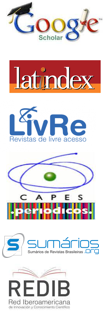A Autoeficácia Docente e sua Relação com a Formação de Professores para a INCLUSÃO de Estudantes com Transtorno do Espectro Autista
DOI:
https://doi.org/10.17921/2447-8733.2024v25n5p640-646Resumo
Neste estudo discutimos o papel da formação inicial e complementar e suas relações com a autoeficácia docente para a inclusão de estudantes com Transtorno do Espectro Autista (TEA). Objetivamos identificar que aspectos da formação profissional estão ligados à autoeficácia docente para promover a inclusão. Participaram do estudo 250 professores de uma secretaria municipal de educação do interior de São Paulo. Os instrumentos utilizados foram o questionário de caracterização do participante e uma escala de autoeficácia docente composta por dois casos de ensino com foco na inclusão de estudantes com TEA, sendo o caso 1 com menor nível de suporte e caso 2 com maior nível de suporte (alfa de Cronbach de 0,96). Os resultados mostraram que a maior parte dos participantes cursou Pedagogia em instituição privada, obtiveram alguma formação para a inclusão de estudantes com TEA, mas com pouca colaboração para que o professor se sentisse seguro para atuar com esses estudantes e que quanto maior o nível de suporte dos estudantes com TEA, menor é a crença de autoeficácia para promover a inclusão. A formação inicial e complementar para o ensino de estudantes com TEA estiveram positiva e significativamente associadas com a autoeficácia docente em ambos os casos de ensino. Concluímos que quanto maior é a crença de que a formação inicial colaborou para que o docente se sinta seguro para realizar práticas inclusivas, maior é a autoeficácia docente para promover a inclusão. Sugerimos continuar pesquisas, capacitações e formações sobre a autoeficácia docente e a inclusão escolar.
Palavras-chave: Autismo. Educação Especial. Formação Profissional.
Abstract
In this study we discuss the role of initial and complementary training and its relationships with teaching self-efficacy for the inclusion of students with Autism Spectrum Disorder (ASD). We aimed to identify which aspects of professional training are linked to teaching self-efficacy to promote inclusion. 250 teachers from a municipal education department in the interior of São Paulo participated in the study. The instruments used were the participant characterization questionnaire and a teaching self-efficacy scale composed of two teaching cases focusing on the inclusion of students with ASD, case 1 with a lower level of support and case 2 with a higher level of support (alpha Cronbach's coefficient of 0.96). The results showed that most participants studied Pedagogy at a private institution, obtained some training for the inclusion of students with ASD, but with little collaboration so that the teacher felt safe to work with these students and that the higher the level of support of students with ASD, the lower their belief in self-efficacy to promote inclusion. Initial and additional training for teaching students with ASD were positively and significantly associated with teaching self-efficacy in both teaching cases. We concluded that the greater the belief that initial training contributed to the teacher feeling safe to carry out inclusive practices, the greater the teacher self-efficacy to promote inclusion. We suggest continuing research and training on self-efficacy and school inclusion.
Keywords: Autism. Special Education. Professional Training.
Downloads
Publicado
Como Citar
Edição
Seção
Licença
Copyright (c) 2025 Revista de Ensino, Educação e Ciências Humanas

Este trabalho está licenciado sob uma licença Creative Commons Attribution-NonCommercial-NoDerivatives 4.0 International License.



